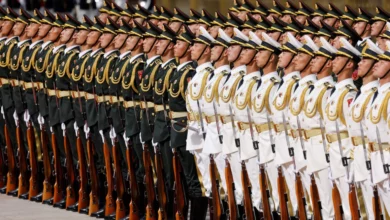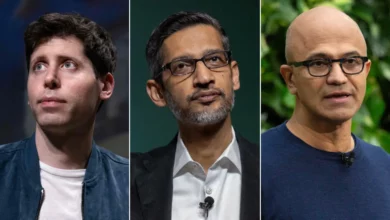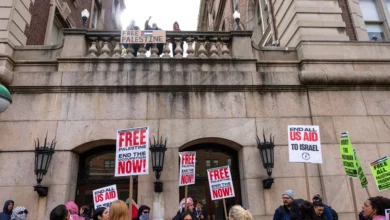Nabil Sharaf Eddin’s column, “The Phobia of Normalization,” in the Arabic edition of Al-Masry Al-Youm on 12 April about the boycott by Egyptian intellectuals and artists of the recent film festival at the French Cultural Center because it included an Israeli film, completely distorts what the boycott of the Israeli production meant and what it sought to accomplish. It is devoid of analysis, amounting to a heap of insults against some of Egypt’s finest creative minds and the countless others around the world who back the boycott.
The campaign for the boycott of Israel is not limited to a few individuals who the writer depicts as a thought police. It has become a world-wide civil society response to the inability of world of governments to impose sanctions on Israel, thanks to the unflinching support the country receives from the United States. The US has already cast more than 40 vetoes on Israel’s behalf, and would be at hand to do so again if Israel becomes a target of sanctions for its war crimes and ceaseless violations of international law and human rights. On the other hand, Washington spares no effort when imposing sanctions on those it considers adversaries or a threat to its own or Israel’s vital interests.
Take Iran, for example. Iran has not invaded any country, does not forcibly occupy any land, is not destroying houses, and is not laying siege to entire communities. Israel, on the other hand, does all of those things. Iran might produce nuclear weapons, but Israel already has them. But who is under threat of American-promoted international sanctions? Iran, not Israel. One need not even look this far. When Hamas won Palestinian parliamentary elections two years ago, the US and the European Union all abandoned the call for democracy in the region and embargoed the Palestinian Islamist movement.
Sharaf Eddin claims that proponents of the boycott lack pragmatism, but ignores the fact that the international boycott worked in the case of South Africa. The boycott campaign against the white minority was orchestrated by the African National Congress, under the leadership of Nelson Mandela and people like Desmond Tutu. Mandela is one of the most revered living leaders in the world, and Tutu one of the most respected voices of conscience. When Bishop Tutu visited Palestine, he described Israel’s rule over the Palestinians as worse than South Africa’s apartheid.
Israel is more concerned about the boycott and about being branded an apartheid state than perhaps any other form of resistance. If one reads the Israeli newspaper Haaretz, one can learn about Israel’s nervous reaction to being delegitimized. Indeed, unless Israel is treated like the pariah state that it is, it will continue to push the Palestinians out of Jerusalem and eventually all of Palestine, perhaps not wholesale, as it did in 1947-1948, but slowly, gradually.
Israel is beyond dialogue. For many years, the Palestinians have met the Israelis in all kinds of forums, official and unofficial, formal and informal, secret and public, academic and people-to-people, young and adults, male and female—all to no avail. Israel has responded by unleashing its army, settlers, and bulldozers. The time has come for the elite of that aggressive state to pay the price.
The boycott also gives the Palestinians an opportunity to apply peaceful pressure. Otherwise, there is only one option: political violence. That is, unless there is a third option, which normalization enthusiasts, like Sharaf Eddin, have yet to reveal. Partly in recognition of the peaceful nature of the boycott and its potential efficacy, a handful of Israeli academics, like Neve Gordon of Ben-Gurion University of the Negev, have also declared their support for it. Some of the leading figures in the academic boycott campaign against Israel in Britain are Jewish.
We also need to understand the motives of those in the French government who insisted on imposing the film on the festival against the wishes of the Egyptian members of the jury and filmmakers whose films were going to be screened, and perhaps against the opinion of the French Cultural Center itself. The purpose of the center is to encourage cultural exchange between the Egyptian and French people, not between Egyptians and Israelis.
When the government of France pushes the film, it is doing two things: First, it is helping Israel in a task that has proven formidable, normalizing with a wide sector of Egypt’s intellectuals and culture producers. We know that President Sarkozy is a strong supporter of Israel. Second, the French government is re-enacting the old colonialist “civilizing mission.” It wants to teach the Egyptian elite tolerance toward and dialogue with the other, values which its predecessors marvelously applied in their treatment of their colonial subjects.
The boycott does not mean ignorance about what is going on in Israel, as Sharaf Eddin and other proponents of normalization allege. It is one thing to read an Israeli journalist online, and another to invite him to one’s office in Cairo. In the first case, the person learns something about what goes on in that state. In the second, one engages in a political act. He sanctions Israel’s behavior and renders its presence normal, which Israel itself has not done! Is there any state today without declared borders? Is there any state that identifies on its passports the nationality of its citizens as being other than the name of the country? Israel does. Sharaf Eddin’s nationality, if he were born an Israeli citizen, would be “Arab.” A Buddhist Israeli citizen would be identified, under the item of nationality, as “Buddhist.” There is no Israeli nationality. Why? Because only Jews anywhere in the world are the real citizens of Israel, whereas the Palestinians, the native inhabitants of the land, are not. Why must we normalize the abnormal?
Fortunately, many Egyptians still believe that Egypt is part, if not the hub, of the Arab world, and has responsibilities toward other Arabs. They believe that this serves Egypt’s interest, and because they are enmeshed in their country’s history and culture. They do not need Sarkozy’s government, which cannot even hold a dialogue with its own Muslim population, to teach them about tolerance.
Sharaf Eddin’s attack on the intellectuals and artists who boycotted the French Cultural Center’s film festival substitutes general pieties for substance. It only lends a hand to Israel at a time when its political system is in the grip of xenophobes.




